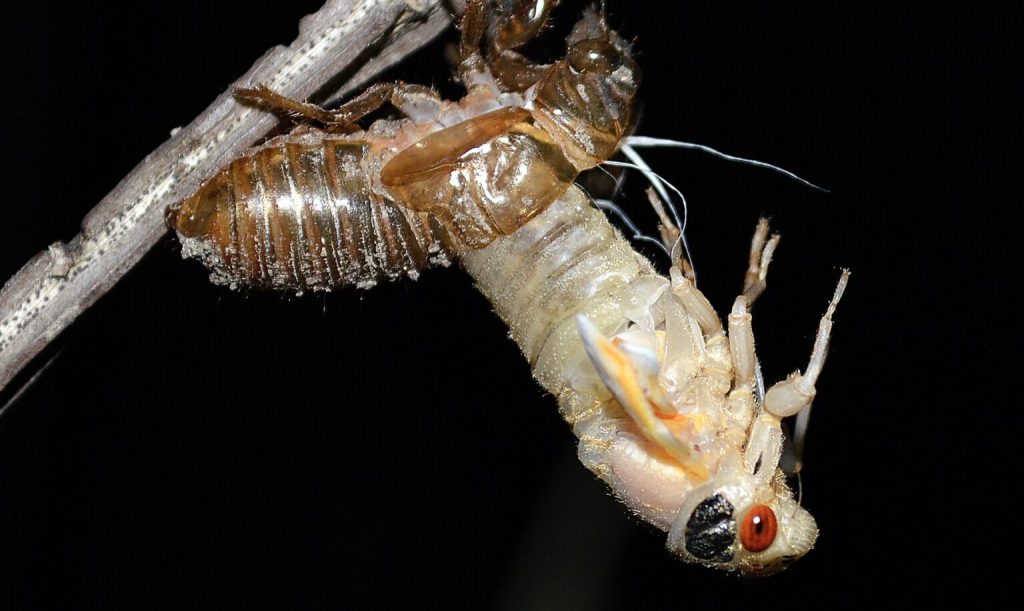KNOXVILLE, Tenn. – A 13-year brood of periodical cicadas, recognized for their loud chirping, are expected to emerge in Middle Tennessee and several southeastern counties in May.
Denoted as “Brood XIX,” these cicadas have been living 13 years underground while they develop, and they will emerge as adults when the soil temperature at 8 inches deep reaches 64 degrees, which is estimated to be in early May.
“Get ready to experience some periodic cicada emergence this spring. Don’t worry; you will hear them well. If you are a bug enthusiast, get out there and enjoy. If you are not, don’t worry. It’ll be over in a month and a half,” said Midhula Gireesh, assistant professor and UT Extension specialist in entomology and plant pathology at the UT Institute of Agriculture.
The periodical cicadas emerging this spring were laid as eggs in 2011, which was considered a spectacular year for the species. In 2011, Brood XIX emerged in Middle Tennessee counties from Wayne along the Alabama border east to Monroe in East Tennessee along the North Carolina border and from Sumner along the Kentucky border to Lincoln County in the south.
Periodical cicadas Magicicada have the longest developmental period among insects. Depending on the race or type, they spend 13 or 17 years underground in larval form, feeding on plant roots. The 13-year periodical cicadas are more common in the Southeastern United States, whereas, the 17-years are usually found in northern states. Varying populations, or broods, emerge during different years. The 17-year Brood XIII is emerging this year as well, but they are located mostly in Illinois and any overlap will occur there. It is the first time since 1803 that Brood XIX and Brood XIII are emerging in the same year, but we will not experience both broods in Tennessee.
Adults are about 1 inch to 1.5 inches long and mostly black with reddish-orange eyes, legs and wing veins. They are harmless to humans and pets, as they don’t sting or bite. They also do not feed on foliage after they emerge. Their egg-laying process may damage young trees, shrubs and ornamentals. Gireesh recommends protecting young and valuable plants with cheesecloth or tobacco canvas while cicadas are present. Insecticide sprays are not effective.
The big question: why are they so loud? “As soon as they emerge, the males start ‘singing’’ to attract the females using two drum-like membranes on the side of the abdomen called tymbals,” Gireesh said.
After mating, the females start to lay eggs by making slits in twigs of woody plants using her knife-like ovipositor. In each slit, the female lays around 24 to 28 eggs. A single female can lay between 400 to 600 eggs. Eggs hatch in six to seven weeks, and the nymphs, which are white and ant-like in appearance, drop to the ground and bury in the soil to find suitable roots. Nymphs grow slowly and feed by sucking sap from roots, but they appear to have no noticeable effect on the trees. After 13 or 17 years, the nymphs emerge and find places to molt, and the new adults emerge several hours later and take flight.
Adult periodical cicadas live only for three to four weeks above ground. The young of Brood XIX will emerge in 2037.
Common annual cicadas can be spotted every year and are generally larger than periodical cicadas. Annual cicadas are about 1.5 to 2.5 inches long and have a green and brown pattern or green and black pattern with a primarily white or greyish underside. Annual cicadas are active during the hot summer days of July through September. These cicadas have two-to-five-year lifecycles and emerge in relatively small numbers to be seen and heard every year.
The University of Tennessee Institute of Agriculture is comprised of the Herbert College of Agriculture, UT College of Veterinary Medicine, UT AgResearch and UT Extension. Through its land-grant mission of teaching, research and outreach, the Institute touches lives and provides Real. Life. Solutions. to Tennesseans and beyond. utia.tennessee.edu.


